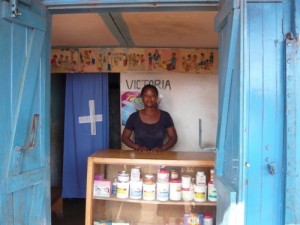Kaduna (Nigeria) – A new study conducted in Uganda has revealed that over prescription of malaria drugs can be reduced when rapid diagnosis tests (RDT) is employed.
Conducted in registered drug shops in a highly endemic area in Uganda, the study shows that the process could help improve the use of drugs to treat malaria cases.
The result of the study published in PLOS ONE reveals how 15,000 patients who visited drug shops with fever were encouraged by researchers to buy the RDT and carry out a test. Results showed that less than 60% of the patients had cases of malaria. The vendors usually complied with the test results, reducing over prescription of malaria drugs by 73%.
The researchers from the Artemisinin-based Combination Therapy (ACT) Consortium at the Ministry of Health in Uganda and the London School of Hygiene & Tropical Medicine in the UK carried out the study because up to 80% of malaria cases in Uganda are treated in the private sector.
The private sector is a common source of treatment in many other malaria-endemic areas, especially where there is poor access to public health facilities. Patients buy antimalarial drugs in shops to medicate themselves, although malaria is not always the cause of their fever, and thus inappropriate treatment is very common.
Prof. Anthony Mbonye from the Ugandan Ministry of Health and lead author of the study, said: “Our findings show that it is feasible to collaborate with the private health sector and introduce malaria RDTs in drug shops. The next step is to refine the strategy and understand the cost implications of scaling it up in Uganda. Our long term aim is to provide evidence to help the World Health Organization develop guidance to improve malaria treatment in the private sector.”
Dr Sian Clarke from the London School of Hygiene & Tropical Medicine, also a principal investigator in the research, said: “This study shows that RDTs can improve the use of ACTs – the most effective treatment for malaria – in drug shops, but it’s not without its challenges. These tests alone will not improve the treatment of other diseases. We now need to continue working with the Ministry of Health to investigate how to improve our approach and expand it to other common illnesses.”
At present, drug shop vendors usually treat patients based on their signs and symptoms without testing their blood for the presence of malaria parasites, as recommended by the World Health Organization. This can result in patients with a fever being over diagnosed with malaria and purchasing an ACT which they don’t need.
Microscopy is a method that requires laboratory equipment and qualified staff, while RDTs are alternative, simple tools that require minimal training to diagnose malaria. These rapid tests can help health workers and vendors in remote locations to prescribe the correct treatment for malaria.
An investigation conducted alongside the trial, published in Critical Public Health, found that despite their popularity, malaria tests were not a simple fix in the private sector. Patients welcomed the RDTs as well as government involvement in improving drug shops, and vendors “felt big” and more akin to qualified health workers in the public sector for being allowed to test blood. But researchers warn that this could give a false impression of vendors’ other skills and services, and regulation by authorities is needed.
Source: Africa Press Organisation
